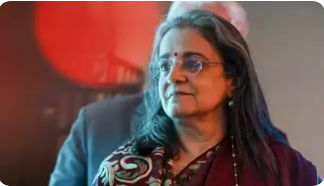SEBI Chairperson recent developments, SEBI Chairperson Madhabi Puri Buch’s decision to forgo a summons to appear before Parliament’s Public Accounts Committee (PAC) has sparked a significant political dispute. The absence, viewed as controversial by various stakeholders, raises essential questions about the scope of PAC’s powers, the autonomy of regulatory bodies, and the potential political undercurrents in legislative inquiries. This article will delve into the dynamics of the PAC’s inquiry, the arguments from both sides, and the implications for India’s financial regulatory landscape.
Background: The PAC and Its Mandate
The Public Accounts Committee, established under India’s Constitution, is a critical parliamentary committee responsible for auditing the revenue and expenditures of the government. Its principal function is to scrutinize how public funds are used. While it has broad oversight powers, the committee’s mandate traditionally does not extend to directly overseeing independent regulatory bodies like the Securities and Exchange Board of India (SEBI). Nevertheless, given SEBI’s key role in India’s capital markets, SEBI Chairperson PAC Chairperson K.C. Venugopal’s decision to summon SEBI’s Chairperson has raised questions and concerns among political parties and financial experts alike.
SEBI’s Regulatory Role and Autonomy
SEBI, established as a statutory body in 1992, holds a pivotal position in regulating India’s securities and capital markets. Its authority is extensive, SEBI Chairperson covering areas from safeguarding investor interests to ensuring fair practices in market operations. SEBI operates under the Ministry of Finance but functions independently of direct government intervention. Therefore, the PAC’s decision to summon SEBI’s Chairperson is seen by some as an encroachment upon SEBI’s independence.  for the more information click on this link
for the more information click on this link
Controversy Surrounding the Summons
Arguments Presented by PAC Chairperson K.C. Venugopal
In issuing the summons, PAC Chairman and senior Congress leader K.C. Venugopal cited the committee’s responsibility to ensure transparent market practices in the public interest. Venugopal emphasized that SEBI, while autonomous, must remain accountable to Parliament, SEBI Chairperson especially concerning any financial irregularities or concerns affecting public investors. Proponents argue that such accountability measures would enhance SEBI’s transparency, reinforcing public confidence in India’s regulatory ecosystem.
Counterarguments from BJP MPs
BJP members, including Ravi Shankar Prasad, have contested Venugopal’s move as a politically motivated attempt to challenge SEBI’s independence. They argue that PAC’s summons exceeds its authority and risks politicizing an institution that must remain neutral and objective. BJP MPs view this as a potential attempt by the opposition to undermine the government’s influence on SEBI, SEBI Chairperson questioning Venugopal’s intention behind issuing the summons.
Ravi Shankar Prasad’s Media Interaction
After the PAC meeting was postponed, BJP MP Ravi Shankar Prasad addressed the media, characterizing the summons as an overreach and criticizing Venugopal for allegedly unilaterally deciding to call SEBI’s Chairperson without bipartisan consensus. Prasad asserted that SEBI’s accountability lies within its regulatory framework, overseen by the Ministry of Finance, SEBI Chairperson and not directly to PAC. By politicizing SEBI’s functioning, Prasad argued, the PAC risks undermining India’s institutional integrity and the autonomy of crucial financial bodies.
Broader Political Implications
A Case of Political Strategy?
The clash reflects a broader political strategy at play, with each side viewing SEBI’s operations through a lens colored by their policy and political interests. Congress, as the opposition, may be using the PAC platform to spotlight potential issues in market regulation, possibly as a way to counter the government’s perceived dominance over regulatory bodies. BJP, in response, SEBI Chairperson contends that SEBI’s independence must be shielded from what they perceive as unwarranted interference under a guise of accountability.
The Risk of Politicizing Financial Regulatory Bodies
The controversy also sparks debate about the boundaries of regulatory oversight. Political influence over bodies like SEBI can lead to a perception of compromised integrity, SEBI Chairperson which may impact investor confidence. Critics argue that allowing PAC to summon heads of independent regulatory bodies could set a precedent for political interference in other autonomous institutions, such as the Reserve Bank of India (RBI).
Legal and Regulatory Perspectives on PAC’s Powers
The incident has provoked discussions on the legal interpretation of PAC’s mandate. Experts highlight that while PAC holds oversight powers, SEBI Chairperson the nature of SEBI’s independent regulatory status means that direct accountability to PAC may not align with its foundational framework. There is a consensus that legal clarity on PAC’s powers and the extent to which they cover autonomous entities like SEBI is essential to avoid similar controversies in the future.  for the more information click on this link
for the more information click on this link
The Role of Accountability and Transparency in Financial Regulation
Despite the controversy, the PAC’s summon has sparked a discussion about the need for greater transparency and accountability in financial regulatory bodies. Some analysts argue that while SEBI must operate independently, SEBI Chairperson an external review mechanism could enhance public confidence. They suggest that Parliament’s role should focus on overseeing SEBI’s overall performance rather than on direct questioning, aligning with global best practices.
Conclusion: Implications for SEBI’s Future and Parliamentary Oversight
The PAC-SEBI controversy is more than just a bureaucratic tussle; it embodies the larger issue of balancing regulatory independence with accountability to democratic institutions. SEBI’s future interactions with parliamentary committees will likely be closely watched, SEBI Chairperson as stakeholders seek to ensure that India’s regulatory institutions maintain their independence while remaining transparent and accountable. For now, the postponed PAC meeting and SEBI Chairperson’s absence serve as a reminder of the complex relationship between regulatory bodies and legislative oversight in India. ALSO READ:- Washington Sundar’s Spellbinding Performance: India Leaves New Zealand Bamboozled with Spin Mastery 2024




